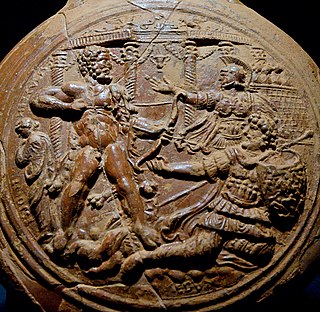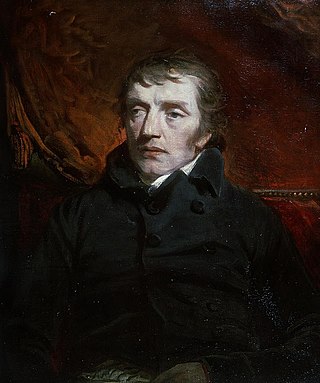Related Research Articles

In Greek mythology, Hector is a Trojan prince, and one of four sons to the King of Troy, he was a hero and the greatest warrior for Troy during the Trojan War. He is a major character in Homer's Iliad, where he leads the Trojans and their allies in the defense of Troy, killing countless Greek warriors and the occasional Hero. However he is ultimately killed in single combat by the Greek Hero Achilles, who later drags his dead body around the city of Troy behind his chariot.

In Greek mythology, Laomedon was a Trojan king, son of Ilus and thus nephew of Ganymede and Assaracus.
In Greek mythology, King Mygdon of Phrygia, was a son of Acmon and father of Coroebus by his wife Anaximene.

Aulus Persius Flaccus was a Roman poet and satirist of Etruscan origin. In his works, poems and satires, he shows a Stoic wisdom and a strong criticism for what he considered to be the stylistic abuses of his poetic contemporaries. His works, which became very popular in the Middle Ages, were published after his death by his friend and mentor, the Stoic philosopher Lucius Annaeus Cornutus.
Lucius Annaeus Cornutus, a Stoic philosopher, flourished in the reign of Nero, when his house in Rome was a school of philosophy.

John Marston was an English playwright, poet and satirist during the late Elizabethan and early Jacobean periods. His career as a writer lasted only a decade. His work is remembered for its energetic and often obscure style, its contributions to the development of a distinctively Jacobean style in poetry, and its idiosyncratic vocabulary.

William Gifford was an English critic, editor and poet, famous as a satirist and controversialist.

The Iliupersis, also known as The Sack of Troy, is a lost epic of ancient Greek literature. It was one of the Epic Cycle, that is, the Trojan cycle, which told the entire history of the Trojan War in epic verse. The story of the Iliou persis comes chronologically after that of the Little Iliad, and is followed by the Nostoi ("Returns"). The Iliou persis was sometimes attributed by ancient writers to Arctinus of Miletus. The poem comprised two books of verse in dactylic hexameter.

John Weever (1576–1632) was an English antiquary and poet. He is best known for his Epigrammes in the Oldest Cut, and Newest Fashion (1599), containing epigrams on Shakespeare, Ben Jonson, and other poets of his day, and for his Ancient Funerall Monuments, the first full-length book to be dedicated to the topic of English church monuments and epitaphs, which was published in 1631, the year before his death.

Elizabethan literature refers to bodies of work produced during the reign of Queen Elizabeth I (1558–1603), and is one of the most splendid ages of English literature. In addition to drama and the theatre, it saw a flowering of poetry, with new forms like the sonnet, the Spenserian stanza, and dramatic blank verse, as well as prose, including historical chronicles, pamphlets, and the first English novels. Major writers include William Shakespeare, Edmund Spenser, Christopher Marlowe, Richard Hooker, Ben Jonson, Philip Sidney and Thomas Kyd.

In Shakespearean scholarship, the Henriad refers to a group of William Shakespeare's history plays depicting the rise of the English kings. It is sometimes used to refer to a group of four plays, but some sources and scholars use the term to refer to eight plays. In the 19th century, Algernon Charles Swinburne used the term to refer to three plays, but that use is not current.

Jack Drum's Entertainment, or the Comedy of Pasquil and Katherine is a late Elizabethan play written by the dramatist and satirist John Marston in 1600. It was first performed by the Children of Paul's, one of the troupes of boy actors popular in that era.

Decimus Junius Juvenalis, known in English as Juvenal, was a Roman poet active in the late first and early second century AD. He is the author of the collection of satirical poems known as the Satires. The details of Juvenal's life are unclear, although references within his text to known persons of the late first and early second centuries AD fix his earliest date of composition. One recent scholar argues that his first book was published in 100 or 101. A reference to a political figure dates his fifth and final surviving book to sometime after 127.

The Satires is a collection of satirical poems written in Latin dactylic hexameters by the Roman poet Horace. Published probably in 35 BC and at the latest, by 33 BC, the first book of Satires represents Horace's first published work. It established him as one of the great poetic talents of the Augustan Age. The second book was published in 30 BC as a sequel.

Ucalegon was one of the Elders of Troy, whose house was set afire by the Achaeans when they sacked the city. He is one of Priam's friends in the Iliad, and the destruction of his house is referred to in the Aeneid.
In Greek mythology, Panthous, son of Othrys, was an elder of Troy, husband of the "queenly" Phrontis and father of Euphorbus, Polydamas and Hyperenor. Because he was the son of Othrys, he had the patronymic Othryades.
In Greek mythology, Pylaeus, son of Lethus, son of Teutamides, descendant of Pelasgus. He was one of the allies to King Priam in the Trojan War; he commanded the Pelasgian contingent together with his brother Hippothous. Pylaeus is hardly ever mentioned separately from his brother; they are said to have fallen in battle together by Dictys Cretensis and to have been buried "in a garden" according to the late Latin poet Ausonius.
-mastix is a suffix derived from Ancient Greek, and used quite frequently in English literature of the 17th century, to denote a strong opponent or hater of whatever the suffix was attached to. It became common after Thomas Dekker's play Satiromastix of 1602. The word μάστιξ (mastix) translates as whip or scourge.

The gens Persia was a minor plebeian family at ancient Rome. Members of this gens are first mentioned during the Second Punic War, but they only occasionally occur in history. The most illustrious of the family was the satirist Aulus Persius Flaccus, who lived during the middle part of the first century.

Troilus and Cressida is a play by William Shakespeare, probably written in 1602.
References
- 1 2 J. Wight Duff, A Literary History of Rome in the Silver Age: From Tiberius to Hadrian, Charles Scribner's Sons, New York, 1927, p.342.
- ↑ Kirk Freudenburg, Satires of Rome: Threatening Poses from Lucilius to Juvenal, Cambridge University Press, Cambridge, 2001, p.154.
- ↑ Kirk Freudenburg, The Cambridge companion to Roman satire, Cambridge University Press, 2005, p.137.
- ↑ RGM Nesbitt, "Persius" in J. P. Sullivan (ed), Critical Essays on Roman Literature: Satire, Routledge & Kegan Paul, 1963, p.42.
- ↑ Bernard H. Newdigate, Michael Drayton and His Circle, Blackwell, Oxford, 1941 p.100
- ↑ Scott McCrea, The Case for Shakespeare, Praeger, Westport, 2005, p.138.
- ↑ Oscar James Campbell, Comicall Satyre and Shakespeare's Troilus and Cressida, C.F. Braun, 1965, p.47.
- ↑ Arnold Davenport (ed), The Poems of John Marston, Liverpool University Press, Liverpool, 1961, p.216.
- ↑ Phyllis B. Tillyard, E. M. W. Tillyard (trans), Milton: Private Correspondence and Academic Exercises, Cambridge, 1932, p.53.